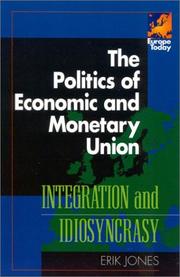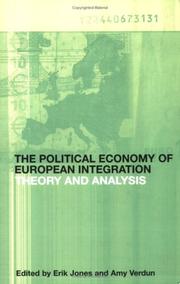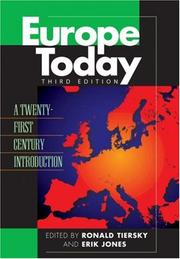| Listing 1 - 10 of 49 | << page >> |
Sort by
|
Book
ISBN: 9780199208333 0199208336 Year: 2008 Publisher: Oxford Oxford University Press
Abstract | Keywords | Export | Availability | Bookmark
 Loading...
Loading...Choose an application
- Reference Manager
- EndNote
- RefWorks (Direct export to RefWorks)
This book seeks to describe and explain the transformation of economic policymaking in Belgium and the Netherlands since the end of World War II. Transformation is seen at the same time as a by-product of the modernization process in the two states and as an important source of both necessary change and increased vulnerability. Consensus is now less characteristic of economic policy-making in the two countries than it used to be and conflict less unusual. The power of traditional elites has been challenged, and they are unlikely to regain the power enjoyed in the past, when Belgium and the Netherlands could be characterized as consociational democracies.
Economic policy and planning (general) --- Netherlands --- Belgium --- Corporate state --- Comparative government --- Politics and government --- Economic policy --- 462 Economisch beleid --- 655.1 Verzuiling --- BE / Belgium - België - Belgique --- NL / Netherlands - Nederland - Pays Bas --- 331.30 --- 331.32 --- 338 (492) --- 338 <493> --- Economische toestand. --- Structuur van de economie. --- Economische situatie. Economische structuur van bepaalde landen en gebieden. Economische geografie. Economische produktie.economische produkten. Economische diensten--Nederland --- Economische situatie. Economische structuur van bepaalde landen en gebieden. Economische geografie. Economische produktie.economische produkten. Economische diensten--België --- Comparative government. --- Politics and government. --- Economic policy. --- 338 <493> Economische situatie. Economische structuur van bepaalde landen en gebieden. Economische geografie. Economische produktie.economische produkten. Economische diensten--België --- 338 (492) Economische situatie. Economische structuur van bepaalde landen en gebieden. Economische geografie. Economische produktie.economische produkten. Economische diensten--Nederland --- Corporations (Corporate state) --- Corporatism --- Corporative state --- Corporativism --- State, Corporate --- Political science --- Syndicalism --- Fascism --- Functional representation --- Comparative political systems --- Comparative politics --- Government, Comparative --- Political systems, Comparative --- Economische toestand --- Structuur van de economie --- Corporate state - Belgium --- Corporate state - Netherlands --- Belgium - Politics and government --- Netherlands - Politics and government --- Belgium - Economic policy --- Netherlands - Economic policy --- Belgique --- Pays-Bas --- Néo-corporalisme --- Politique et gouvernement --- Politique économique

ISBN: 0847690342 0847690350 9780847690350 Year: 2002 Publisher: Lanham, Md Rowman & Littlefield
Abstract | Keywords | Export | Availability | Bookmark
 Loading...
Loading...Choose an application
- Reference Manager
- EndNote
- RefWorks (Direct export to RefWorks)
Book
ISBN: 9780230221888 9780230221871 0230221874 0230221882 Year: 2011 Publisher: Basingstoke Palgrave Macmillan
Abstract | Keywords | Export | Availability | Bookmark
 Loading...
Loading...Choose an application
- Reference Manager
- EndNote
- RefWorks (Direct export to RefWorks)
"This all-new replacement for Developments in European Politics brings together specially commissioned chapters by leading authorities on European politics -- East and West -- to provide a systematic assessment of developments in political institutions and processes, politics and society, and policy"--
European federation --- Europe --- Economic integration --- Politics and government --- -Intégration économique --- Politique communautaire --- BPB1404 --- 341.2422 --- Federation of Europe --- Pan Europa movement --- Paneuropean federation --- United States of Europe (Proposed) --- Federal government --- Regionalism (International organization) --- Economische integratie --- Communautair beleid --- Council of Europe countries --- Eastern Hemisphere --- Eurasia --- -Politics and government --- -European federation --- Intégration économique --- ekonomická integrace --- majandusintegratsioon --- integración económica --- economic integration --- ekonomska integracija --- wirtschaftliche Integration --- lánpháirtíocht eacnamaíoch --- економска интеграција --- ekonominė integracija --- integração económica --- hospodárska integrácia --- gazdasági integráció --- economische integratie --- integrim ekonomik --- integrazione economica --- integrare economică --- økonomisk integration --- integrazzjoni ekonomika --- taloudellinen yhdentyminen --- ekonomikas integrācija --- integracja gospodarcza --- οικονομική ολοκλήρωση --- икономическа интеграция --- gospodarsko povezovanje --- ekonomisk integration --- економско интегрирање --- sjednocovací postupy --- sjednocovací procesy --- hospodářská integrace --- začlenění do společné ekonomiky --- gospodarska integracija --- politika tal-UE --- unionin politiikka --- EU policy --- politika EÚ --- политика на ЕУ --- política da UE --- uniós politika --- ES politika --- πολιτική της ΕΕ --- liidu poliitika --- EU-beleid --- политика на ЕС --- politika EU-a --- politikë e BE-së --- EU-Politik --- política de la UE --- политика ЕУ --- EU-politik --- politika EU --- polityka unijna --- politica UE --- politica dell'UE --- κοινοτική πολιτική --- politica CE --- Kopienas politika --- política comunitaria --- politique de l'Union européenne --- politika Skupnosti --- Gemeinschaftspolitik --- политика на Общността --- политики на Европската Унија --- política comunitária --- yhteisön politiikka --- politika Spoločenstva --- politika Zajednice --- politika Europske unije --- politika Společenství --- EF-politik --- communautair beleid --- EG-beleid --- politica comunitaria --- közösségi politika --- ühenduse poliitika --- gemenskapspolitik --- Bendrijos politika --- Community policy --- политика Заједнице --- politică comunitară --- polityka wspólnotowa --- fællesskabspolitik --- politique communautaire --- beartas an Aontais Eorpaigh --- European federation - Congresses --- Europe - Economic integration - Congresses --- Europe - Politics and government - 1989- - Congresses --- Intégration économique
Book
ISBN: 1281341460 9786611341466 0191549037 Year: 2008 Publisher: Oxford ; New York : Oxford University Press,
Abstract | Keywords | Export | Availability | Bookmark
 Loading...
Loading...Choose an application
- Reference Manager
- EndNote
- RefWorks (Direct export to RefWorks)
This work offers a provocative argument about the impact of political change on the economic strategies of small states, focusing on Belgium and the Netherlands. It argues that a transformation in the style of politics from consensus to competition has constrained the traditional formulae for economic policymaking.
Corporate state --- Comparative government. --- Belgium --- Netherlands --- Politics and government. --- Economic policy. --- Comparative political systems --- Comparative politics --- Government, Comparative --- Political systems, Comparative --- Political science --- Corporations (Corporate state) --- Corporatism --- Corporative state --- Corporativism --- State, Corporate --- Syndicalism --- Fascism --- Functional representation
Book
Year: 2009 Publisher: Place of publication unknown
Abstract | Keywords | Export | Availability | Bookmark
 Loading...
Loading...Choose an application
- Reference Manager
- EndNote
- RefWorks (Direct export to RefWorks)
Business cycles --- Netherlands --- Belgium
Book
Year: 1973 Publisher: Rockville Department of Health, Education and Welfare
Abstract | Keywords | Export | Availability | Bookmark
 Loading...
Loading...Choose an application
- Reference Manager
- EndNote
- RefWorks (Direct export to RefWorks)
Book
ISBN: 1788212851 1788212843 1788212827 1788212835 Year: 2020 Publisher: Newcastle upon Tyne : Agenda Publishing,
Abstract | Keywords | Export | Availability | Bookmark
 Loading...
Loading...Choose an application
- Reference Manager
- EndNote
- RefWorks (Direct export to RefWorks)
In 1969 a small group of US scholars began discussing the possibility of starting a consortium of Western European Studies programmes. Europe was increasingly becoming an object of study and it was felt that greater coordination of the intellectual effort would help avoid duplication and further the acceleration of research. So began the Council for European Studies.
In commemoration of the founding of the Council fifty years ago, this volume brings together some of the most influential Europeanists writing today to take stock of the subject and to consider the most fruitful avenues for future research. With European democracy seemingly under threat from populism on the left and the right, the economies of countries still struggling to emerge from a decade of recession and stagnating growth, environmental concerns paramount and the quest for social cohesion a distant goal, the contributors to this volume bring their insight to bear on the fertile ground that the EU and the continent more broadly offer researchers.
The contributors - drawn from 52 institutions across the globe - present a wide range of perspectives on Europe's past and present, and the key challenges facing its future, such as immigration, multiculturalism, nationalism and integration. Although it remains to be seen whether Europeans will continue to promote the dream of union or whether they will retreat back into their nation states, these essays offer valuable insights into how Europe might respond and the changing nature of what it means to be a European.
European communities --- Research. --- Council for European Studies. --- Europe --- Study and teaching.
Book
ISBN: 9781788212847 9781788212823 9781788212830 Year: 2020 Publisher: Newcastle upon Tyne Agenda Publishing
Abstract | Keywords | Export | Availability | Bookmark
 Loading...
Loading...Choose an application
- Reference Manager
- EndNote
- RefWorks (Direct export to RefWorks)

ISBN: 0415340632 0415340640 1134297262 1280546921 0203463064 9780203463062 0203671821 9780203671825 9780415340632 9780415340649 9781134297269 9781134297214 1134297211 9781134297252 1134297254 Year: 2005 Publisher: London Routledge
Abstract | Keywords | Export | Availability | Bookmark
 Loading...
Loading...Choose an application
- Reference Manager
- EndNote
- RefWorks (Direct export to RefWorks)
This book provides a balanced introduction to diverse political economy perspectives on different aspects of European integration, demonstrating both the importance and the potential of research in this area. The volume includes three types of chapters: broad literature reviews, narrower applications of existing arguments, and new syntheses of competing claims. The authors also present a critical appraisal of how scholars in the EU and US use theory to understand European integration, and examine issues such as citizens' attitudes, perceptions and preferences of actors, the role of n
International relations. Foreign policy --- International economic relations --- European Union --- Europe --- European Union countries --- Pays de l'Union européenne --- Economic integration. --- Economic policy. --- Intégration économique --- Politique économique --- #SBIB:044.AANKOOP --- #SBIB:327.7H21 --- 337.142 --- Ontwikkeling van de Europese Unie (historische en toekomstige evolutie) --- European Economic Community countries --- -European Union countries --- -EU countries --- Euroland --- Common market countries --- European common market countries --- Economic policy --- -Economic integration. --- Europe - Economic integration. --- Europe-- Economic integration. --- European Economic Community countries - Economic policy. --- European Union countries - Economic policy. --- Pays de l'Union européenne --- Intégration économique --- Politique économique

ISBN: 9780742555013 0742555011 Year: 2007 Publisher: Lanham, Md Rowman & Littlefield
Abstract | Keywords | Export | Availability | Bookmark
 Loading...
Loading...Choose an application
- Reference Manager
- EndNote
- RefWorks (Direct export to RefWorks)
| Listing 1 - 10 of 49 | << page >> |
Sort by
|

 Search
Search Feedback
Feedback About UniCat
About UniCat  Help
Help News
News